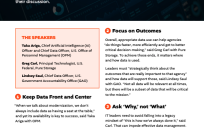If you’re like most government agencies, you and your team have spent countless hours trying to make information available to your constituents, only to discover that they still need to call the support center to get answers. How can agencies break this unproductive cycle and remove the resource intensive burden on their already overworked staff?
The main reason it is difficult for people to find answers is that 80% of the data that contains the answers is unstructured, free-form text. It is extremely challenging for traditional search tools and chatbots that use keyword-based methods to identify the answers needed. These approaches fall short because they cannot accurately interpret the context and nuances in a natural language question.
Compounding the issue is that it has been difficult to know what specific content needs to be created in the first place. Current search engines encourage users to type only a few keywords rather than a full sentence to avoid a list of irrelevant results. Search histories with just a few disconnected keywords don’t tell content creators what users want to know, which forces them to look for clues elsewhere.
Enter the Age of Search Engines 2.0: the “Answer Engine”
A relatively new technology has emerged and is ushering in the next generation of search. Known as “answer engines,” this new approach enables end users to ask questions in full sentences. This gives content creators deeper insight into what their constituents want to know by allowing them to understand topics such as “how do I change my name on my driver’s license” rather than just “driver’s license.” Government agencies can gain deeper insight into the detailed questions their constituents are asking to understand what’s missing in their content repository, and tailor their information accordingly.
These Answer Engines use natural language processing (NLP) to understand not only the keywords, but also the intent of the user’s question. By focusing on the semantic understanding and the underlying intent of words, answer engines provide highly relevant, comprehensive responses instantly in one click, rather than a lengthy list of potentially relevant links or huge documents to scan.
Another benefit is that answer engines can also help to democratize information. By providing direct answers to questions, answer engines can make information more accessible to people who may not have the time or expertise to navigate complex government websites or databases. This can help to bridge the digital divide and ensure that everyone has access to the material they need to make informed decisions.
Not Without Its Challenges
Of course, there are some challenges associated with adopting answer engines. The most important is ensuring that the system provides accurate and trustworthy information. The second issue is training the system to understand the nuances of each agency’s language and domain-specific terminology. Answer engines must be trained to understand this language and provide accurate answers based only on each agency’s data, not the internet at large, despite how the question is presented. ChatGPT too often returns unacceptable levels of inaccurate information and does not provide any explainability and is therefore not an answer engine.
Adopting answer engines is becoming increasingly popular across all industries, but for government agencies the benefits are even more clear. Not only can they provide deeper insight into what constituents want to know, improve the user experience, and democratize information, but they ultimately build trust and engagement. As governments seek to improve relationships with their community of users, they need to evaluate newer and more automated approaches to effectively answer questions and consider answer engines as a new and critical tool to achieving positive engagement among users.
Ryan Welsh is the founder and CEO of Kyndi, a global provider of the Kyndi Platform for the Natural-Language-Enabled Enterprise, an AI-powered platform that empowers people to do their most meaningful work. To learn more visit https://kyndi.com/ or follow them on LinkedIn and Twitter.




Leave a Reply
You must be logged in to post a comment.